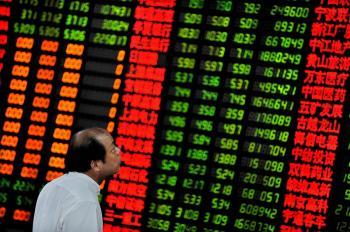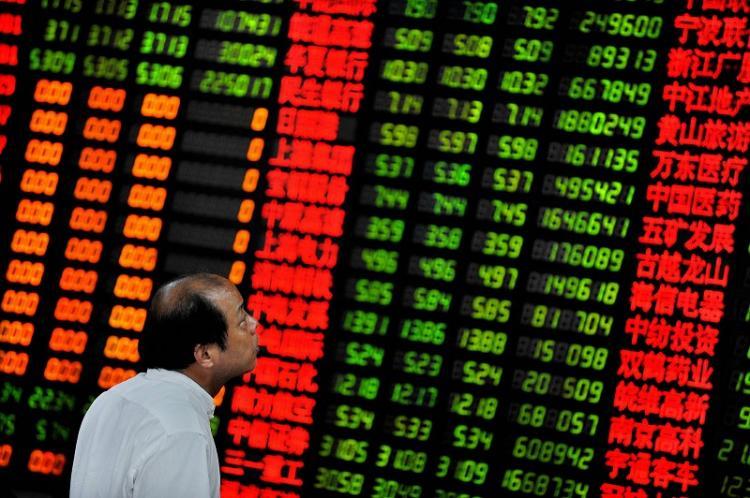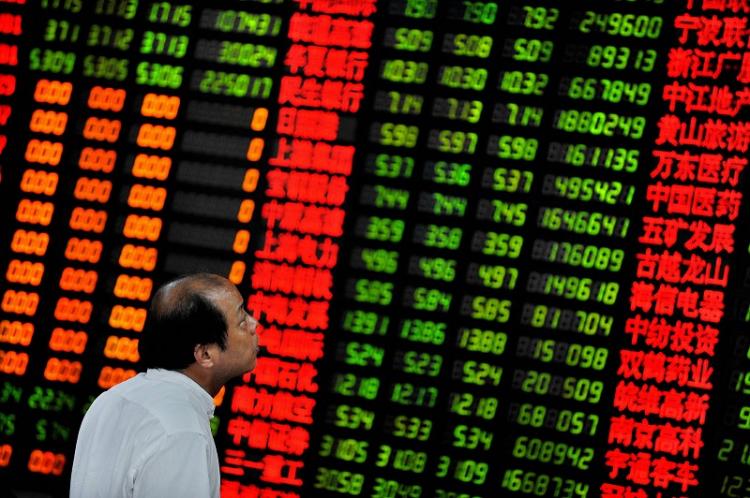China’s stock market hit a nine-month low on August 18, drawing a mixture of expert commentary.
Voice of America (VOA) reported that both the Shanghai Composite Index and the Shenzhen Component Index have tumbled, with the former falling below 2,900 points after hitting 3,000 points not long ago, believed to mark the point when investors will lose confidence in the market and begin selling their stocks.
An analyst from Huatai Securities, as reported by Reuters, believes such volatility in the Chinese stock market will continue, since the market recovery and the regime’s policy on the securities market are still unclear at this point.
China’s FDI was down 35.7 per cent compared to July of last year, according to Ministry of Commerce spokesman Yao Jianon on Monday, August 17. The country has also experienced a significant decline in foreign direct investment (FDI) in July, according to the Chinese Ministry of Commerce.
Zhang Xiaoji, Director of the Research Department of the Foreign Economic Relations of the Development Research Center under the State Council, stated that short term analysis of foreign investment is meaningless.
“The launch of one or two major projects will impact the market data,” Zhang was quoted as saying in the state-run Xinhua News Agency. However, he also admitted that, as the global economy is yet to recover, China is bound to be adversely affected.
Zhang Weijing, professor of Guanghua School of Management at Peking University has argued that by 2040 China will account for one quarter of the world’s economy.
Others believe this conjecture is overly optimistic, asserting that both the Chinese and international economies are facing serious challenges.
Gordon Chang, an American scholar and analyst on China’s social development, explained during an interview with VOA that after the cold war, the global economic trend was toward an increase in trade between countries. Currently, the trend is the opposite, and China needs to restructure the economic framework—not an easy task under the current circumstances.
He suggested that both China and the international community face this reality and remove the apparently adulterated portion of Chinese official data during analysis and judgment.
Chang indicated that there are two problems with official statistics. “The first and also the most important is the high volatility of the Chinese economy, and that statistical methods have not been able to keep up. In these circumstances, methodologies of data collection are far from complete.”
The second issue, he said, is that “the Chinese government doesn’t tell the truth.”
Chang commented that China’s official data for the end of last year and beginning of this year is a “complete mess.” While admitting decline in import, export, government fiscal revenues, foreign investment, electric production, and so on, officials still claim an increase in gross domestic product (GDP).
Beijing’s official economist Li Yining said the Chinese economy is facing three hurdles in an interview with Xinhua. First, China’s exports are falling because of the international economic impact. Second, the growth of domestic consumption is not as fast as originally envisioned. Third, economic restructuring is a relatively slow process.
Read the original Chinese article.
Voice of America (VOA) reported that both the Shanghai Composite Index and the Shenzhen Component Index have tumbled, with the former falling below 2,900 points after hitting 3,000 points not long ago, believed to mark the point when investors will lose confidence in the market and begin selling their stocks.
An analyst from Huatai Securities, as reported by Reuters, believes such volatility in the Chinese stock market will continue, since the market recovery and the regime’s policy on the securities market are still unclear at this point.
China’s FDI was down 35.7 per cent compared to July of last year, according to Ministry of Commerce spokesman Yao Jianon on Monday, August 17. The country has also experienced a significant decline in foreign direct investment (FDI) in July, according to the Chinese Ministry of Commerce.
Zhang Xiaoji, Director of the Research Department of the Foreign Economic Relations of the Development Research Center under the State Council, stated that short term analysis of foreign investment is meaningless.
“The launch of one or two major projects will impact the market data,” Zhang was quoted as saying in the state-run Xinhua News Agency. However, he also admitted that, as the global economy is yet to recover, China is bound to be adversely affected.
Zhang Weijing, professor of Guanghua School of Management at Peking University has argued that by 2040 China will account for one quarter of the world’s economy.
Others believe this conjecture is overly optimistic, asserting that both the Chinese and international economies are facing serious challenges.
Gordon Chang, an American scholar and analyst on China’s social development, explained during an interview with VOA that after the cold war, the global economic trend was toward an increase in trade between countries. Currently, the trend is the opposite, and China needs to restructure the economic framework—not an easy task under the current circumstances.
He suggested that both China and the international community face this reality and remove the apparently adulterated portion of Chinese official data during analysis and judgment.
Chang indicated that there are two problems with official statistics. “The first and also the most important is the high volatility of the Chinese economy, and that statistical methods have not been able to keep up. In these circumstances, methodologies of data collection are far from complete.”
The second issue, he said, is that “the Chinese government doesn’t tell the truth.”
Chang commented that China’s official data for the end of last year and beginning of this year is a “complete mess.” While admitting decline in import, export, government fiscal revenues, foreign investment, electric production, and so on, officials still claim an increase in gross domestic product (GDP).
Beijing’s official economist Li Yining said the Chinese economy is facing three hurdles in an interview with Xinhua. First, China’s exports are falling because of the international economic impact. Second, the growth of domestic consumption is not as fast as originally envisioned. Third, economic restructuring is a relatively slow process.
Read the original Chinese article.






